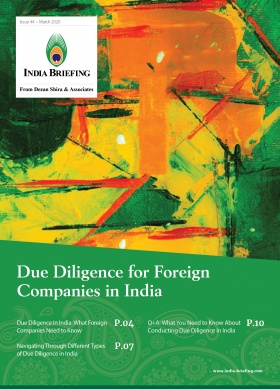Filing Form 3CEB: What You Need to Know
Under transfer pricing regulations, companies in India are expected to file Form 3CEB if the entity has entered into any international transaction with an associated enterprise or some specified domestic transaction (the latter with effect from assessment year 2013-14).
This is filed alongside Form 3CD under Section 92A to 92F of the Income Tax Act, 1961. Form 3CD is a detailed statement of particulars related to various aspects of the business and transactions undertaken.
For more information and tax and audit assistance for foreign firms doing business in India, please feel free to email us at india@dezshira.com.
What is Form 3CEB and when does it apply?
Form 3CEB is applied if companies engaged in international and specified domestic transactions with any associated enterprise. All companies that conducted such transactions must provide a detailed report from a chartered accountant.
Form 3CEB follows two conditions as set forth by transfer pricing regulations:
- A transaction between any two or multiple associated businesses, either or both being foreign businesses, is an international transaction; and
- Specified domestic transactions are those connected to transfer pricing but do not include international transactions. (Transfer pricing is the price one company levies on another company for the goods and services it has rendered.)
What do we mean by specified domestic transactions?
According to the Income Tax Act specified domestic transactions must satisfy certain parameters. The transaction(s) should fall under Section 92BA of the Act, which describes them as:
1) Transactions listed under Section 80A, which correlate with the market price of goods and services.
2) Transactions of goods and services listed under sub-section 8 of Section 80IA.
3) Business transactions listed under sub-section 10 of Section 80IA.
4) Transactions listed in any other section on which the provisions of sub-sections 8 and 10 of Section 80IA are also applied. There are five such provisions that are as follows:
- 80IAB – The profits of a business will be subtracted if it is a part of a developing Special Economic Zone.
- 80IB – The profits of specific industrial ventures will be subtracted as compared to specific development of infrastructure ventures.
- 80IC – There will be special provisions for specific businesses that fall under special category states.
- 80ID – The profits of a business will be subtracted if it is a hotel business and if it is a convention center located in a specific area.
- 80IE – There will be special provisions for those specific businesses that lie within northeastern states.
5) The transaction is not international.
6) The transaction will fall under domestic pricing only if its aggregate value is more than the threshold limit of INR 200 million (US$2.7 million) (from assessment year 2016-17).
What qualifies as an international transaction?
According to the Income Tax Act, international transactions must meet the following conditions:
- The transaction occurs between two or more associated enterprises, either or both of which are foreign entities;
- The transaction includes sale or lease of physical/tangible property and services provided, or lending or borrowing money or any other transaction that has impacts profits, income, losses, and/or assets of such enterprises; and
- There is a mutual arrangement or agreement reached between two or more associated enterprises for the purpose of allocating or apportioning or making any contribution to any cost incurred or to be incurred – in connection with a benefit, service, or facility provided or to be provided to any one or more of such enterprises.
Accordingly, companies will need to submit Form 3CEB if they have entered into an international transaction or specified domestic transaction.
What are the reporting requirements in Form 3CEB?
- Taxpayers must provide general personal information as well as the aggregate value of the international transactions that have been undertaken;
- Taxpayers must provide information about the international transactions that were undertaken during the financial year calculated as April 1 to March 3; and
- Taxpayers must provide information about the specified domestic transactions that were undertaken during the financial year.
Due to the uncertainties and delays caused by the COVID-19 pandemic this year, tax authorities in India have extended the deadline for furnishing various audit reports under the Income Tax Act, including the tax audit report and report with respect to international/specified domestic transaction, to December 31, 2020. Previously, the due date for the report to be furnished in Form 3CEB with respect to international and specified domestic transactions was October 31, 2020.
What is the penalty for incompliance?
Penalties are triggered if the company fails to file Form 3CEB in the expected format. These are:
- Fine of minimum INR 100,000 (approx. US$1,352) if the report is not presented as the required Form 3CEB;
- Fine of two percent of the value of the transaction if the given information on them is inadequate; and
- Fine of two percent of the value of the transaction if the given information on them is incorrect.
About Us
India Briefing is produced by Dezan Shira & Associates. The firm assists foreign investors throughout Asia from offices across the world, including in Delhi and Mumbai. Readers may write to india@dezshira.com for business support in India.
- Previous Article Tax Audit Report for AY 2020-21 in India: Some Considerations
- Next Article How Will India’s Revised FDI Policy Impact Future Chinese Investment?







